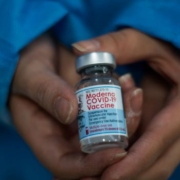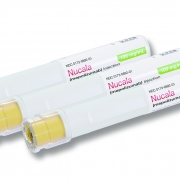A group of scientists from the Nuffield Department of Women’s & Reproductive Health at Oxford University may have found a potential key to finally treating endometriosis, a disease that affects around 176 million women worldwide.
The use of Pfizer Inc. and German partner BioNTech SE’s widely used Covid-19 vaccine marginally increases the risk of heart inflammation, but the risk is higher among those infected with the coronavirus, a study published on Aug. 25 in the New England Journal of Medicine showed.
Health officials are looking into Canadian data that suggests the risk of heart inflammation after Moderna’s Covid-19 shot is occurring at higher rates in younger adults than previously believed.
The Feinstein Institutes for Medical Research, the research unit of New York State health care provider Northwell Health, may have found a way to control neurons that drive inflammation.
The U.S. Food and Drug Administration approved GlaxoSmithKline plc’s Nucala (mepolizumab), a monoclonal antibody that targets interleukin-5, as a treatment for patients with chronic rhinosinusitis with nasal polyps (CRSwNP).
Members of the U.S. military who were vaccinated against Covid-19 showed higher-than-expected rates of heart inflammation, although the condition was still extremely rare, according to a study released on June 29.
Israel’s Health Ministry found the small number of heart inflammation cases observed mainly in young men who received Pfizer’s Covid-19 vaccine in Israel were likely linked to the company’s vaccination.
The U.S. Food and Drug Administration released a briefing document on May 4 citing concerns regarding clinical data for ChemoCentryx’s investigational rare autoimmune disease therapy avacopan. ChemoCentryx is seeking approval from the FDA for the drug as a therapeutic agent for anti-neutrophil cytoplasmic auto-antibody-associated vasculitis (AAV).
U.S. CDC has not seen link between heart inflammation and Covid-19 vaccines
BNT162b2 (Pfizer and BioNTech), CDC Director Rochelle Walensky, Covid-19 Data, COVID-19 Vaccinations, COVID-19 Vaccines, Department of Defense, Inflammation, Myocarditis, Pfizer, U.S. Centers for Disease Control and PreventionThe U.S. Centers for Disease Control and Prevention (CDC) has not found a link between heart inflammation and Covid-19 vaccines, the agency’s Director Rochelle Walensky said on April 27.
Inflammation: A necessity and a threat to COVID-19 patients
Anti-Inflammatory, Antibodies, Biology, Coronavirus Disease (COVID-19) Pandemic, COVID-19 Vaccines, Cytokines, Fall/Autumn, Inflammation, Patient Outcomes, SARS-CoV-2 virus, Symptoms: Coronavirus Disease 2019 (COVID-19), Tumor Necrosis Factor (TNF), WinterBlocking TNF production could offer a more effective solution for the treatment of COVID-19.









